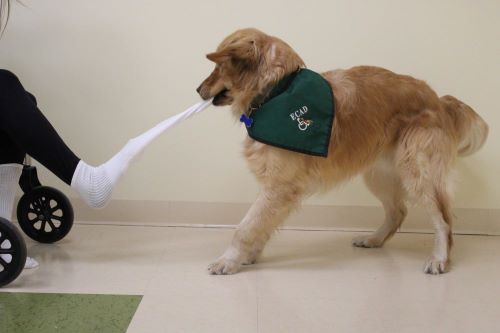Multiple Sclerosis (MS) is one of many incurable conditions affecting a person’s physical abilities. On May 30, 2024, World MS Day, Educated Canines Assisting with Disabilities (ECAD) is pleased to help change the world for people living with MS.
People living with MS may experience various symptoms due to the disease attacking the central nervous system and affecting the body’s ability to communicate with the brain. The condition can result in vision problems, fatigue, reduced arm and leg mobility, and balance problems.
If you have MS or are a caregiver for someone with MS, there are many ways a Service Dog could improve quality of life and assist the disabled individual in multiple tasks.

How Service Dogs Help People Living with MS
Although MS can be mild, it can also be disabling for some people, so Service Dogs can be a great help. Moving for those whose MS conditions are more severe can be challenging, making even the most mundane tasks difficult. Opening doors, getting dressed, or even turning on a light switch can be an overwhelming task on bad days.
In addition, people with MS often have numbness in their legs, resulting in instability leading to balance issues causing falls. Canes can help, but physicians increasingly prescribe balance dogs to people with MS.
A Service Dog can help with numerous tasks, whether walking with assistance or using a wheelchair. One study even showed that the assistance of a Service Dog could even improve the gait of a person living with MS.
Because they can be trained for either situation, Service Dogs can be flexible if you both walk and use a wheelchair if you grow tired during the day. In addition, depending on your individual needs, Service Dogs can learn multiple commands to assist you with many daily tasks, including:
- Opening drawers and retrieving items
- Picking up dropped objects
- Helping with dressing and undressing
- Turning lights off and on
- Assisting you with balance issues
For example, a Service Dog can assist people with getting in and out of chairs by bracing as the person gets up or sits down, picks up dropped items, like a pen or telephone, pushes buttons in an elevator and even turns house and room lights on or off.
For example, one ECAD-trained Service Dog, Crane, provides Tina, a wife and mother living with MS, with her balance and stability when she spends time
outdoors with her family taking care of her goats and other animals. Crane is also always on hand to retrieve Tina’s cell phone, keys, or anything else she drops since she can no longer bend over.
Qualifying for a Service Dog
Unfortunately, the number of people with disabilities who need and want Service Dogs exceeds the availability, making the wait quite long.
To be eligible for a service animal, you must meet the ADA criteria for a disability, have documentation from a medical professional that indicates a service dog could improve or support your condition, and provide any additional organization required documentation. The ADA requirements are updated frequently, so visit its site for changes.
You must also meet specific requirements to receive a Service Dog from ECAD, including the resources to care for the dog.
Help Us Change Lives
The life-altering impact of Service Dogs for a person living with MS or any disability is impossible to understate. Service Dogs keep people with disabilities safe, making it possible to lead independent lives. Everyone can take part in helping people with disabilities with Service Dogs. Support us with a donation, bequest, or planned giving, contribute to our wish list, or create a fundraiser of your own. Your support can change someone’s life.
